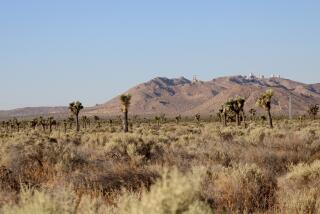Mojave’s contentious cross
Christian crosses and other religious symbols are common sights in a military cemetery, and appropriately so. But the U.S. Supreme Court will be asked today to approve a war memorial in California’s Mojave National Preserve that consists entirely of an 8-foot-high cross. It would offend the 1st Amendment if the court endorsed this discriminatory display in a public space. Even worse would be a broad decision opening the way for other such displays.
In 1934, the Veterans of Foreign Wars erected a cross along with a plaque commemorating the “Dead of All Wars” on an outcrop called Sunrise Rock. In 1999, the National Park Service rejected a request to place a Buddhist shrine near the cross. In 2001, a former National Parks Service employee, a Catholic, filed suit, claiming that the cross violated the 1st Amendment’s ban on establishment of religion. In order to evade a court order, Congress voted in 2003 to transfer control of the land on which the cross stood to the VFW in exchange for another parcel.
According to the U.S. Justice Department, that maneuver removes any constitutional problem. Solicitor General Elena Kagan also argues that Frank Buono, the former park service employee who complained about the cross, lacks standing to bring a lawsuit because he hasn’t been subjected to “unwelcome religious exercises, indirect coercion or exclusion from the political community.” Neither objection is persuasive. The administration takes a narrow view of standing that would put some unconstitutional displays beyond legal challenge. As for Congress’ land swap, because the cross will be situated in what the appeals court called a “little donut hole” in a vast tract of land, an observer would have a hard time distinguishing public from private.
This case poses an even greater danger to the 1st Amendment. The court has seesawed confusingly on the constitutionality of religious displays on public property. In separate 5-4 decisions on the same day in 2005, it struck down the posting of the Ten Commandments in courthouses in Kentucky but upheld a Ten Commandments monument on the grounds of the Texas Capitol. Stephen G. Breyer, the only justice to vote for both results, wrote that the latter monument was permissible because it had stood on public land for 40 years without protest. That loose standard could be used to justify the Mojave cross.
In both of the 2005 cases, Justice Sandra Day O’Connor voted to strike down the displays. Her replacement, Justice Samuel A. Alito Jr., seems less supportive of the idea of a wall of separation between church and state. If Breyer and Justice Anthony M. Kennedy -- a swing vote in religion cases -- don’t stand up for the 1st Amendment, this case could blow a gaping hole in that wall.
More to Read
Sign up for Essential California
The most important California stories and recommendations in your inbox every morning.
You may occasionally receive promotional content from the Los Angeles Times.










